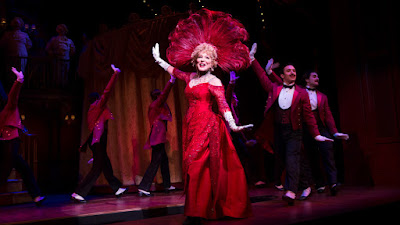The Sam Gold-helmed version of
The Glass Menagerie isn't for everyone (as you can see by reviews
here and
here ), but this stripped-down version of Tennessee Williams' 1945 memory play shouldn't be entirely discounted.
The
bare bones set with its black exposed walls gives a bit of a shadowbox
feel that belies the open space and surrounds the actors with an
ever-present shroud of darkness. A rack piled with props, like dishes,
sits close to a metal kitchen table and orange chairs. A neon sign
blares "Paradise Open" in green and red. Though stark and jarring at
first, the look mimics memory -- etching out the most enduring details
with the rest fading into background. It somewhat echos the look of
Fun Home,
which Gold won the 2015 Tony for Direction of a Musical, where a bed, a
desk, a piano also isolate moments of the narrator's recollection
rather than sweeping scenery.
The Glass Menagerie's
casting is unusual. First, Joe Mantello, with his grey-infused mop, is a
few years past his early 20s, Tom's age as the play opens. With the
2013 revival, where Zachary Quinto received rave reviews (the
New York Times
called his performance "career-defining") still fresh, seeing a
middle-aged Tom initially feels disconcerting. Still, the older Tom's
viewpoint takes the audience into Tom's current perspective -- we feel
his angst more deeply as we look at the man he's become
rather than the remembrance of the boy he was.
Then
there's Madison Ferris making her Broadway debut as Laura, the first
wheelchair user to perform a major role on the Great White Way.
Williams' own description of Laura states, "A childhood illness left her
crippled, one leg slightly shorter than the other, and held in a brace.
. ." So amplifying the character's disability alters the play
tremendously. As the play begins, this intensification provides
distraction. Watching Ferris manipulate her body, inching it in an
elaborate effort as she moves from chair to floor and back, takes the
audience from Tom's world into Laura's. I missed lines as I watched her
arduous maneuvers.This casting choice reinterprets Williams' vision and,
to me, gives Laura a strength I haven't seen in any other version. Yes,
Laura is still fiercely reclusive and awkward, but not fragile. The
fortitude she displays in her day-to-day physical challenges gives Laura
depth as a character. Her fascinations -- her crystal creatures and
old-fashioned music -- become a way to find beauty in a difficult world
rather than mere hiding places. Her condition forces the characters to
interact with her physically as they help her move: their motions become
awkward, too, as in the first scene where Sally Field carries Laura's
folded chair up the stairs. At times, this makes the production clunky,
but it also weaves an acutely tangible love into their actions.
The truth is Williams' stage directions don't always work. The first time I saw
The Glass Menagerie
on Broadway in 1994, with Julie Harris as the genteel Southern belle
and Calista Flockhart as Laura, Kevin Kilner as the Gentleman Caller and
Zeljiko Ivanek as Tom, director Frank Galati chose to use Williams' original stage directions calling for "slides bearing images or titles"
and periodically projected words such as "The sky falls" on the stage,
interrupting the magic of the unfolding scene.
But
reinventing a classic does have its pitfalls and the current version's
deviations do lessen the impact of Tom's journey. The stark set doesn't
include a fire escape and Tom's musings where he dreams of another life
get lost in the dark apartment. The production puts everyone in more
contemporary clothing even though their dialogue is obviously from
another time. That's disconcerting, too. At one point, Sally Field
twirls out in a cotton-candy froth of a dress, aping girlishly in front
of the Gentleman Caller (a charming Finn Wittrock) and she looks nearly
clownish in a caricature of someone clutching to her youth.
In
general, Field's Amanda seems too young and soft, more beguiling than
strident, and it changes her interactions with Laura and Tom. She
simmers with anger -- her disappointment in life festering in her
restless hands and arms. But the character never turns hawkish and the
relentless commentary that drives Tom away and Laura inward sounds more
annoying than invective.
There's also that pointless rain
-- a sudden downpour that leaves puddles on stage. So much so, that the
actors are forced to step over them. Yet, another distraction.
Ultimately, Gold plays with transformation in this production too much,
forgetting what story he is telling until
The Glass Menagerie loses some of its potency.






